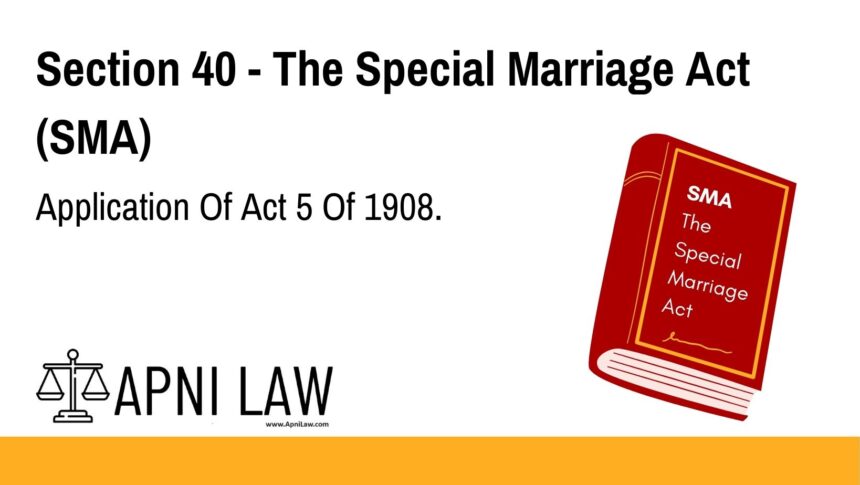Code: Section 40
Subject to the other provisions contained in this Act, and to such rules as the High Court may make in this behalf, all proceedings under this Act shall be regulated, as far as may be, by the Code of Civil Procedure, 1908 (5 of 1908).
Explanation of Section 40 – Special Marriage Act
Section 40 of the Special Marriage Act (SMA) establishes that, in general, all proceedings under the Act shall be governed by the provisions of the Code of Civil Procedure, 1908 (CPC), unless otherwise specified in the Special Marriage Act itself.
This provision ensures that the procedural aspects of cases under the SMA follow the guidelines set out in the CPC, which is the primary legislation for civil procedure in India. However, it also allows the High Court to make specific rules to regulate such proceedings, where necessary, to suit the unique nature of marriage-related cases under the Special Marriage Act.
Key Points:
- Applicability of CPC: All proceedings under the SMA will be regulated by the Code of Civil Procedure, 1908, subject to the provisions of the Special Marriage Act.
- High Court Rules: The High Court may make specific rules to govern such proceedings, providing flexibility for the courts to adapt procedures when necessary.
- Consistent with Other Provisions: The section also makes it clear that if there are other provisions in the SMA that contradict the CPC, those provisions will take precedence.
Illustration
Example 1: Civil Procedure in SMA Cases
In a case under the Special Marriage Act, if a person is filing for divorce or seeking alimony, the procedural aspects such as the filing of petitions, serving of notices, and appeal processes will follow the same rules as any civil suit under the Code of Civil Procedure, 1908.
Example 2: Specific Rules by the High Court
If a party wants to challenge a decision made under the Special Marriage Act in a family law matter, the High Court may create rules to streamline such challenges. These rules would be specific to the nature of the cases handled under the SMA, but they would still follow the broader framework of the CPC.
Common Questions and Answers on Section 40 SMA
Q1. Does Section 40 mean that all matrimonial cases under the SMA will follow the Code of Civil Procedure, 1908?
Yes, all proceedings under the Special Marriage Act will generally follow the procedures of the Code of Civil Procedure, 1908, unless specifically provided for in the Special Marriage Act itself.
Q2. Can the High Court change the procedural rules for cases under the SMA?
Yes, the High Court has the authority to make specific rules for proceedings under the Special Marriage Act, as long as those rules are consistent with the broader framework of the Code of Civil Procedure.
Q3. Will all procedures related to marriage and divorce under the SMA follow the CPC?
In general, yes. However, any specific provisions in the Special Marriage Act that differ from the CPC will take precedence.
Conclusion
Section 40 of the Special Marriage Act ensures that cases under the Act are handled according to the established Code of Civil Procedure, 1908, unless specific exceptions are provided. The provision ensures procedural uniformity while also allowing for flexibility through rules made by the High Court to meet the specific needs of marriage-related cases.
For more information on family law and matrimonial procedures, visit ApniLaw for expert insights and advice.








